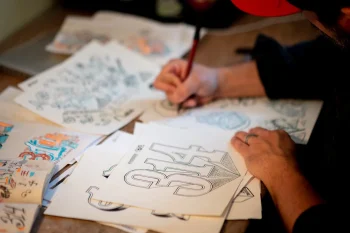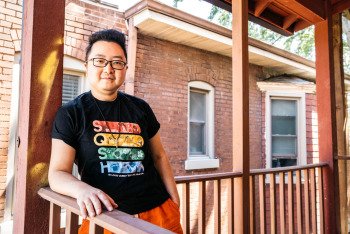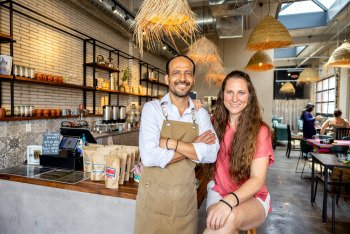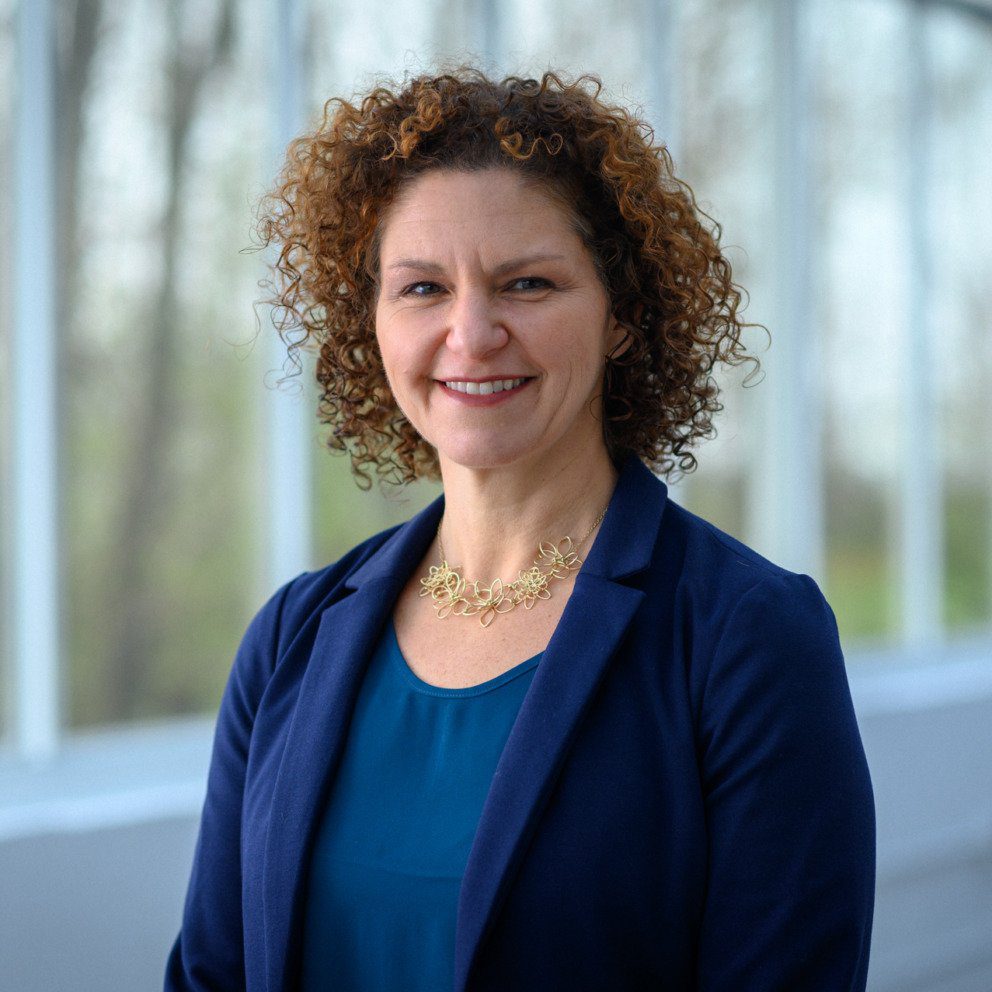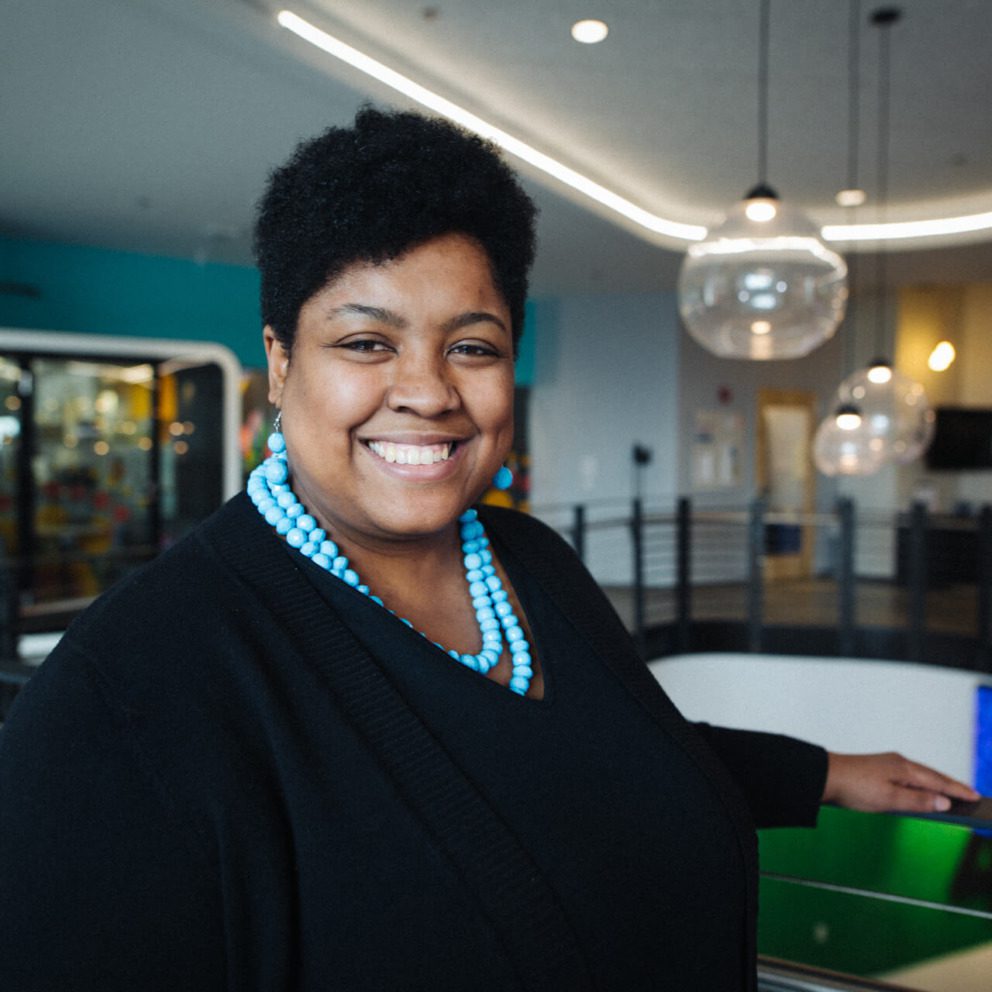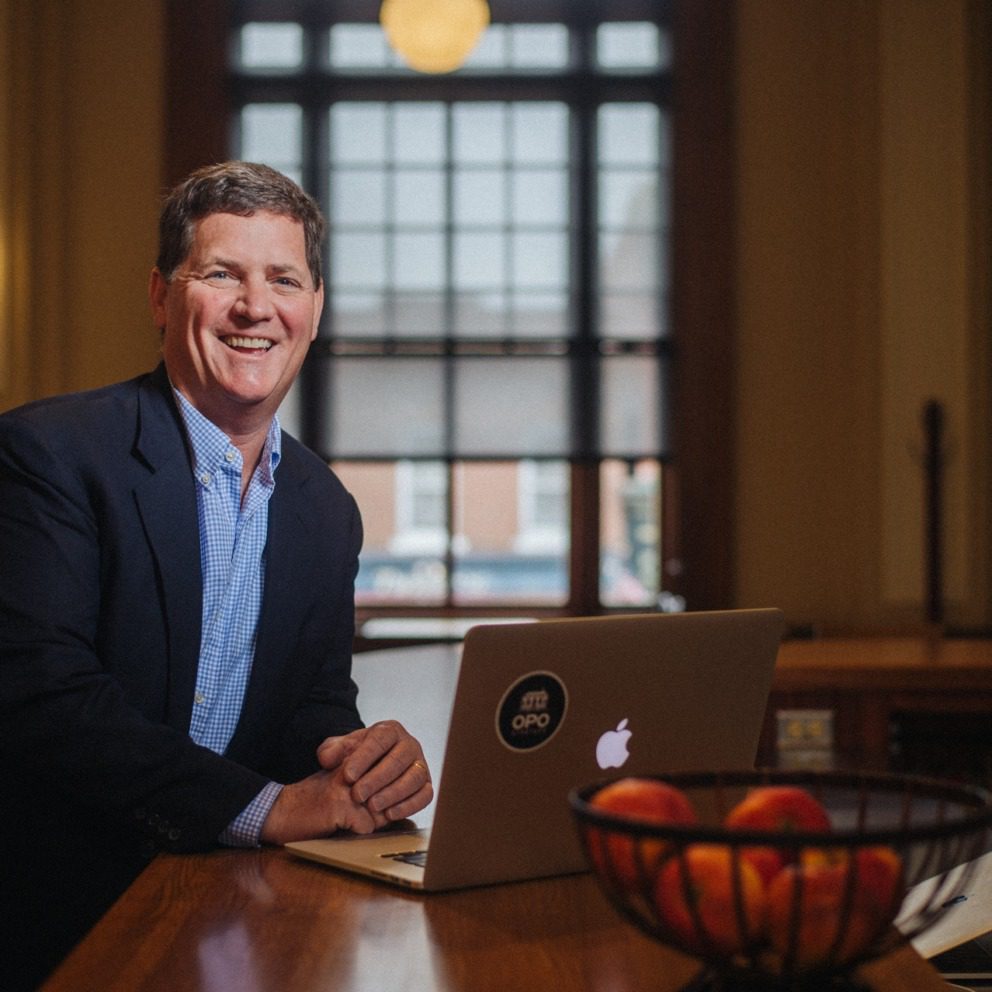Opening Doors
Dwayne Smith's first job was with the National Geospatial-Intelligence Agency, and now, through education, he seeks to build up the geospatial workforce in St. Louis.
With a smile on his face and a warmth to his voice, Dwayne Smith, Ph.D. gives no indication of what he has gone through to reach his professional achievements.
“I’m an ordinary man doing extraordinary things,” says Smith, humbly.
Many people would disagree that he is just an ordinary man. It’s extraordinary that he has overcome so many challenges, and that he uses those experiences to fuel his advocacy for others. He wants all students to get the kind of support and opportunities that enabled him to go from one of St. Louis’ poorest neighborhoods, Wells/Goodfellow, to the highest levels of leadership in higher education.
“I’m always optimistic, really. And I think that kind of stems from me growing up when things are so bleak, all of us trying to think that there was going to be a brighter day,” Smith says. “I’d be up in the middle of the night just dreaming, thinking about how things will be better for me and be better for my family.”
Dr. Smith’s career in education includes recruiting for Truman State University, as graduate faculty at the University of Missouri and his most recent position as interim president of Harris-Stowe State University. Under his leadership, Harris-Stowe has increased the number of degrees offered by 75 percent, developed undergraduate research and added STEM programs.
But his first job, the one that allowed him to save up for his first car and employed him during summers in high school and college, was with the National Geospatial-Intelligence Agency (NGA), known at the time the Defense Mapping Agency Aerospace Center. When he was just a teenager, he started his career at the NGA as a custodian through a program for young workers that provided them with training so they would have opportunities to be promoted within the organization. Smith was able to work his way up to be a data transcriber.
In a full-circle moment, as provost, vice president of academic affairs and then interim president of Harris Stowe State University, Smith has partnered with the NGA to help develop the geospatial workforce in St. Louis. The NGA recently made the largest ever federal investment in St. Louis, and the largest ever investment of any kind in North St. Louis, breaking ground for its new 1.75 billion dollar, 97-acre campus, dubbed Next NGA West. Smith also serves on the GeoFutures Advisory Committee, which has helped lead the development of the GeoFutures Strategic Roadmap to strengthen the metropolitan area as the global center of geospatial excellence over the next 10 years.
Smith sees the NGA’s investment in St. Louis and the growing geospatial field as rife with future employment opportunities, and recognizes the importance of making sure that students in St. Louis are receiving high-quality education so that they can find jobs in the geospatial industry — especially students who are in circumstances similar to the ones that he grew up in.
“I grew up in extreme poverty in the 60s and 70s,” Smith says. “My mother was the daughter of sharecroppers in the heart of the Jim Crow era. None of her 10 siblings, with the exception of one, finished high school, mainly because the White school board in her small town determined that Black people did not need education. They eliminated the 12th grade so Black people could pick cotton. Many Black people were illiterate, but my mother finished the 11th grade twice because her strong belief that education would be the engine that drove opportunity for her children.”
Smith says his mother emphasized how important it was for them to get a good education, that by studying and working hard, they could have a path to a better life. It’s clear that her words were effective – among her seven children, they hold ten degrees. But growing up in poverty affected Dwayne Smith deeply. He recalls how he hated having to go stand in line to pick up food through a government assistance program because of how he was treated by the workers handing out food.
“I remember the harshness of the treatment, and being impoverished and powerless, but that no one cared. Those memories are still seared in my psyche,” Smith says. He feels that the Black Lives Matter protests that have occurred in May and June of 2020 as a response to the police killing of George Floyd are not just because of police brutality, but also because of poverty and racial inequality.
“With a lot of the protests, it has been not just about the treatment of Black people by the hands of the police,” Smith says. “It’s the treatment of poor people and Brown people.” Of the most recent videos of police violence captured on cell phones and shared via social media, Smith says, “They just laid it bare, for the world to see, that there’s a different type of treatment for African Americans by police officers, but there’s also a different type of treatment across the board for African Americans.”
Smith has experienced racism in many instances and forms, but some of the clearest in his mind are the times when he’s been pulled over by police. When he was working at the NGA, he had an issue with his car that a White colleague offered to fix. One evening, he was driving slow through his coworker’s neighborhood, trying to locate his house, when a police car passed by him and then turned around to pull him over. “They come up and say, ‘May I help you?’ What they are essentially saying is, ‘Why are you in this neighborhood?’” Smith says. “That was one of the earliest moments I realized, I wasn’t doing anything but being Black in a White neighborhood, and I was getting harassed.”
Later on in his career, Smith purchased a Mercedes-Benz car and would get pulled over, but not for speeding. “I would get stopped and asked, ‘Whose car is this?’ And I would always figure out a way to disarm police officers,” says Smith. “In a sense, police officers are supposed to be trained to disarm people. And I learned how to do that.”
While Smith learned how to diffuse tense situations, he also understands the rage that people feel when they’re treated unjustly. When he was an assistant vice president of academic affairs, Smith was on his way home from a funeral when he was pulled over. The police officers took him out of the car, patted him down and searched his vehicle. “That was the only time I kind of lost it, when they asked me if I was carrying drugs,” says Smith. They let him go without ever telling him why they had stopped him in the first place.
With thousands of people around the country braving the pandemic to protest in the streets, Smith says, “I’m a firm believer that this is symptomatic of what’s going on in our society in terms of lack of opportunities. I figure that, if I can provide access and opportunity, that can make a difference at the root of this and really, the inequalities that exist in our country.”
Smith sees that the potential for geospatial industry growth in St. Louis could be a game-changer for Black St. Louisans, even though the concept of geospatial technology is one that many people are unfamiliar with.
“When you think about, ‘What are the things that propelled our movement forward?’, it sounds foreign to say geospatial,” says Smith, “but geospatial can be an equalizer in opportunities, the same way that years ago, it was the post office.” The Post Office Department (POD) became the single largest employer of African Americans in the United States between 1961-1966. He explains that the Post Office jobs helped build a Black middle class when many companies were not hiring Black people for well-paying jobs. “It just kind of shifted a movement, in a sense,” says Smith. “So why not geospatial? Particularly for St. Louis.”
The story of how quality education can open doors and provide opportunities can be told through Smith’s own family. “This is the first generation of the Smiths that actually earned college degrees. We traced our lineage back to 1820,” Smith says. “It was 150-something-years later that the first Smith earned a college degree in America. And so that shifted the direction, and the trajectory of our lives.”
The impact of a college degree on earning potential is especially apparent with first-generation students at historically Black colleges and universities. According to one study assessing HCBUs, a first-generation student graduating with a degree will earn 70% more in their career than if they just had a high school diploma. “At Harris-Stowe, in 2020 there’s still individuals who, no one in their lineage has graduated with a college degree. And they’ve been in the country hundreds of years,” says Smith.
– Dwayne Smith, Ph.D.
While he’s soon to depart St. Louis to take on the role of CEO at Housatonic Community College in Bridgeport, Connecticut, Smith thinks the region is rife with opportunities for those who want to make an impact.
“One thing that I say often is that St. Louis is a place that you can run into the mayor,” says Smith. “You can be in spaces where you have the so-called movers and shakers of St. Louis. You won’t find that in New York. You’re not going to run into the mayor of New York at an event. You’re not going to run into people. St. Louis has opportunities to connect with people, to tell your story.”
Join the Story
- To see Dr. Smith and other experts discuss the strategic roadmap for making St. Louis a global center of geospatial excellence, check out this webinar.
- New to the geospatial industry? Check out this growing list of ways geospatial technologies are used to solve the world’s problems.
- Learn more about the history of the NGA in St. Louis.
- Read about how Saint Louis University professor Enbal Shacham, Ph.D., used geospatial technology to track the spread of the coronavirus.

